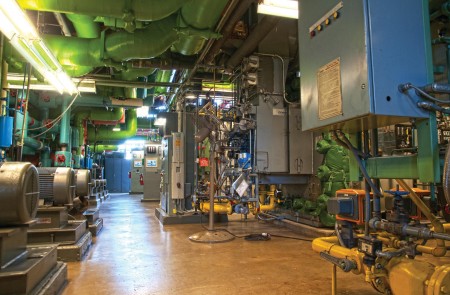George Mason University is utilizing the latest, most innovative technology to provide students with energy-efficient heating and cooling on campus.
“We use a high-temperature hot water system, not steam,” said Jeffrey Counts, assistant superintendent of the heating and cooling plant at Mason. “Steam systems are common. High-temperature hot water systems are not very common. In the future, they probably will be. They are more efficient and require a lot less maintenance.”
The hot water system not only provides heating for students in both classrooms and dormitories but also provides domestic hot water, which students use when they shower and brush their teeth.
“Our high-temperature hot water goes through a heat exchanger at the location [of the housing facilities] and their heat exchanger converts the hot water to domestic water for the showers,” Counts said.
The heating and cooling plant also utilizes a chill-water system that cools about 92 percent of the campus.
Though the hot water system requires less maintenance than a steam system, there are still several things that can go wrong. According to Counts, a weld joint may break, expansion joints and the high temperature valves may leak and the slip joints might break or corrode. Slip joints are used to join two things that may or may not be in motion. Expansion joints are used to absorb heat-caused expansion.
The four maintenance workers staffing the heating and cooling plant spend roughly 50 percent of their time keeping the hot water system in working order, Counts said.
The heating and cooling plant has installed sump pumps — devices used to pump water — and installed alarms on the pumps so that if something goes wrong, an alarm goes off in the heating and cooling plant. Additionally, a visual indicator locates the source of the problem.
The plant monitors the amount of chemicals in the high-temperature hot water that are present to prevent corrosion and also checks the pH levels and conductivity of the water.
Monitoring these levels allows Mason to save energy and money.
“We’re pretty much doing everything to operate at peak efficiency,” Counts said. “We clean our own boilers. We clean our own cooling towers. And, sometimes, we maintain our own equipment instead of sending it out for repair. We can get a lot of stuff repaired pretty cheap for [Mason].”
Counts, who has been at Mason for 25 years, said that even though he could get paid more elsewhere, he enjoys working at Mason.
“I’ve been here for 25 years and I’m going to see it through till the end,” he said.
Counts also believes that his crew is topnotch and hard-working.
“There are some people who are lazy. You won’t find them here,” Counts said. “My guys are reliable. They go out and get the job done.”







Comments